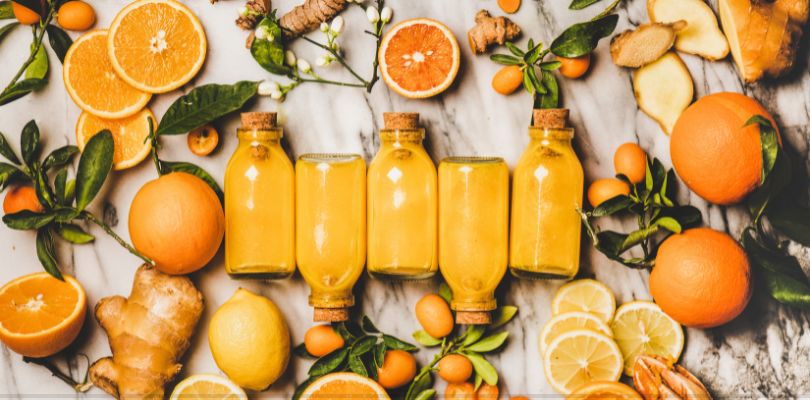What is Eosinophilic Esophagitis?
Eosinophilic esophagitis (EoE) is a chronic immune system disease. It occurs when eosinophils, a type of white blood cell, build up in the esophagus. This leads to inflammation and damage. Managing EoE involves dietary restrictions to help alleviate symptoms. Below are ten drinks that people with EoE should steer clear of, along with explanations of why these beverages can be harmful.
Drinks to Avoid with Eosinophilic Esophagitis
1. Citrus Juices
Citrus juices like orange, lemon and grapefruit are highly acidic. The acidity can irritate the already inflamed esophagus, exacerbating EoE symptoms such as pain and difficulty swallowing. These drinks can also lead to acid reflux, which can further worsen esophageal inflammation.
2. Tomato Juice
Tomato juice is another acidic beverage that should be avoided. Like citrus juice, its acidity can aggravate the esophagus, making it more challenging to manage EoE symptoms. The natural compounds in tomatoes, such as histamine, can also trigger allergic reactions, which might increase eosinophil activity.
3. Carbonated Beverages
Soda and other carbonated drinks can cause bloating and pressure in the stomach, leading to acid reflux. The carbonation can also cause direct irritation to the esophageal lining, worsening symptoms of EoE. Additionally, these beverages often contain caffeine and sugar, both of which can be problematic for those with EoE.
4. Alcohol
Alcohol is a major irritant for the esophagus. It can cause inflammation and increase the permeability of the esophageal lining, making it easier for eosinophils to infiltrate and cause damage. Alcohol can also relax the lower esophageal sphincter, leading to acid reflux and worsening EoE symptoms.
5. Coffee
Coffee, whether caffeinated or decaffeinated, can be problematic for people with EoE. The high acidity of coffee can irritate the esophagus, and the caffeine content can relax the lower esophageal sphincter, promoting acid reflux. Both of these effects can lead to increased inflammation and discomfort.
This article will cover the worst Medicare advantage plans for seniors. Read on to learn about which plans you should avoid.
6. Milk
Dairy products, including milk, are common triggers for EoE. Some people with EoE have an allergic response to milk proteins, leading to increased eosinophil activity in the esophagus. Consuming milk can cause swelling, difficulty swallowing, and other EoE symptoms.
7. Chocolate Drinks
Hot chocolate and chocolate-flavored beverages contain both caffeine and theobromine, which can relax the lower esophageal sphincter and increase the likelihood of acid reflux. The sugar content in these drinks can also contribute to inflammation, making them a poor choice for individuals with EoE.
8. Energy Drinks
Energy drinks are loaded with caffeine, sugar and various additives that can irritate the esophagus and trigger EoE symptoms. The high caffeine content can exacerbate acid reflux, while the sugar and artificial ingredients can lead to inflammation and worsen the condition.
9. Peppermint Tea
While herbal teas are generally safe, peppermint tea is an exception for people with EoE. Peppermint has a relaxing effect on the lower esophageal sphincter, which can promote acid reflux and worsen esophageal inflammation. This makes peppermint tea a drink to avoid.
10. Soy Milk
Soy is a common allergen and can trigger EoE symptoms in sensitive individuals. Soy milk contains proteins that can provoke an immune response, leading to increased eosinophil activity and inflammation in the esophagus. For those with soy allergies or sensitivities, it’s best to avoid soy milk altogether.
Safe Drinks for People with Eosinophilic Esophagitis
While many drinks can trigger EoE symptoms, several beverages are generally safe and can be part of a balanced diet for those with EoE:
- Water: Water is the safest and most recommended drink for people with EoE. It helps keep the esophagus hydrated and doesn't irritate the lining.
- Aloe vera juice: Aloe vera juice is soothing and can help reduce inflammation in the esophagus. Ensure it is free from added sugars or citrus.
- Coconut milk: For those without a coconut allergy, coconut milk can be a good dairy alternative that is less likely to trigger EoE symptoms.
- Chamomile tea: Chamomile tea is a mild herbal tea with anti-inflammatory properties, making it a safe option for people with EoE.
Treatment Options for Eosinophilic Esophagitis
Managing EoE typically involves a combination of dietary changes, medications and sometimes medical procedures. Here are some common treatment options:
- Elimination diet: This involves removing common allergens (e.g., dairy, wheat, soy, eggs, nuts and seafood) from the diet to reduce eosinophil activity in the esophagus.
- Proton pump inhibitors (PPIs): These medications reduce stomach acid production, helping to minimize acid reflux and esophageal irritation.
- Topical steroids: Swallowed steroids, such as fluticasone or budesonide, can reduce inflammation in the esophagus and alleviate symptoms.
- Biologics: Biologic drugs, such as dupilumab, target specific components of the immune system to reduce eosinophil activity and inflammation in the esophagus. Biologics are an emerging treatment option for patients with severe or refractory EoE.
- Endoscopic dilation: In cases where the esophagus becomes narrowed, endoscopic dilation can help widen the esophagus, making swallowing easier.
By avoiding trigger drinks and following an appropriate treatment plan, individuals with EoE can better manage their symptoms and improve their quality of life.







